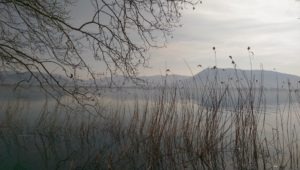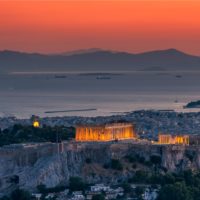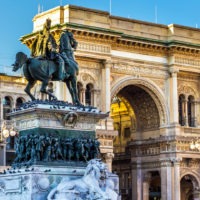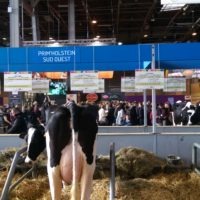been the company. You can see that her perspective has a focus. Her questions are concise, to the point and show someone who is centered and after a long life knows what’s important.
The Mountaintop of Pulses
The mountain village of Kastoria has 12,500 people. The center of town seems bigger than it should until I realize how many empty rooms there are. Greece’s economic crisis didn’t initially hit Kastoria as hard due to a brisk business with Russia in animal furs. To get an idea of how important the fur trade is here, the literal translation of Kastoria is “beaver.” With the sanctions, ruble currency devaluation and drop in Russian oil prices, business dried up. What I’m seeing now are the metaphorical cracks in Kastoria’s economic drought.
The town starts to fade away as we drive. Snow covered mountains lie in the distance. An orchard of disfigured black trees decorates the highway, looking like a nightmare. Turning onto a side road, we pass a small Christian shrine. It is a holy mailbox covered in rexd, blue and off-white plaster.
I finally break down and ask Trifon about his golden co-pilot Jesus. Turns out that it was Trifon’s father’s, and he hangs it in the same way that his Dad did. It looks like the crosshairs of a rifle scope but the significance now makes sense.

We arrive at the house of a farmer named Thomas in the town of Melissotopos. Every summer bees are brought from the south to his plantation. When harvesting for pollen, these insects also transfer genetic material from bean plant to bean plant. The result is better testing and better quality plants. His seeds are not genetically modified (though how GMO and non-GMO crops can avoid cross contamination is still a mystery to me).
Thomas gives us directions to one of his farms. We follow a dirt road with a swath of grass running down the middle. A barren plot of land greets our arrival. It is almost grey in color with dashes of green here and there. Mountains surround us in the distance, dark with trees and the shadows of floating clouds. The land has that formerly churned look, awaiting only a thaw in the cold weather. Long, black rubber tubes like bicycle tires run the length of the property. Holes in them water the fields.
A dead pricker bush on my right has dark, purple leaves signaling a return to life. Thorns run up the spine of the leaf to the very tip. Thomas stands in front of it, explaining how he doesn’t use any fertilizers even though the hard shell of the bean protects the interior. Nearby I can hear the croaking of frogs. An amphibian’s thin skin absorbs chemicals in any environment. Like canaries in a coal mine, they are also the first to die. So if Thomas was using a lot of pesticides on his farm, there wouldn’t be as many aquatic creatures around. Frog music backs up Thomas’ assertion.
When spring finally arrives, Thomas will be ready with a hoard of sharpened bamboo sticks. Like a Vietnamese guerilla fighter, he sharpens each stake and stabs the earth 72 cm away from the previous one. His large, black hook knife clears the sides of each stick to ensure the beans grow straight up. As the vines start to bear pulses, they are tied together with other vines to support their burgeoning weight. Each plot forms a teepee whose top yields the harvest. As Thomas explains all of this to me, a lonely monastery in the distance listens on.
Trifon drives us to the second farm where Mr. Kyriakis and his wife greet us. With snow white hair and tan face, he reminds me of some Greek cinema star I can’t quite place. His concrete home




